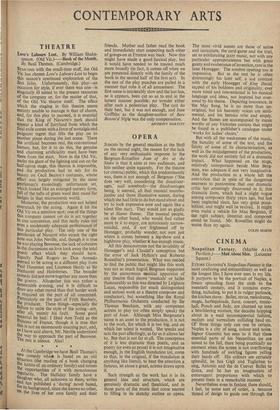OPERA
JUDGED by the general reaction at the Stoll on the second night, the reason for the lack of any very enthusiastic response to- the Bergman-Rossellini Joan of Arc at the Stake is that it aims at two audiences, and hits neither quite squarely. For the theatre (or cinema) public, which this predominantly was, there is not enough of Bergman (' She does very well, considering the disadvant- ages,' said somebody—the disadvantages being, it seemed, all that musical mumbo- jumbo and those illustrative scenes, during which she had little to do but stand about and try to look expressive now and again like a silent film star). They would just as gladly be at Siamo Donne. The musical people, on the other hand, who would find rather more in it to enjoy, are notoriously narrow- minded, and, if not frightened off by Honegger, probably wonder, not sure just where it comes between a leg-show and a highbrow play, whether it has enough music.
All this demonstrates not the invalidity of Honegger's and Claudel's conception but the error of Jack Hylton's and Roberto Rossellini's presentation. What was needed to find the public that might like this work was not so much Ingrid Bergman supported by the anonymous musical apparatus of any theatre that shows 'musicals' or ballet (honourably as this was directed by Leighton Lucas, responsible for much distinguished and serious work as a theatre composer and conductor), but something like the Royal Philharmonic Orchestra conducted by Sir Thomas Beecham, with any competent actress to play (or often simply speak) the part of Joan. Although Miss Bergmann's name is an asset to the production, it is not to the work, for which it is too big, and on which her talent is wasted. She speaks and acts the part affectingly, as far as it allows her to. But that is not far at all. The conception of it is less dramatic than poetic, and as poetry (or even as prose) it is not imaginative enough, in the English translation (or, come to that, in the original, if the translation is anything like literal), to bear the attention a famous, let alone a great, actress draws upon it.
Such strength as the work has is in its general idea and structure, which are genuinely dramatic and theatrical, and in those parts of the music that come nearest to filling in its sketchy outline as opera.
The most vivid scenes are those of satire and caricature, the card-game and the trial, set to exhilarating jazzy music, not with any particular appropriateness but with gteat gaiety and exuberance of invention, rare in the later Honegger. The sombre opening too is impressive. But in the rest he is often distressingly his later self, a sad contrast with the early Honegger of King David, sapped of his boldness and originality, ever more timid and conventional in his musical language and ideas, not inspired but over- awed by his theme. Depicting innocence, in the May Song, he is no more than un- original, but his heavenly voices are senti- mental, and his heroics trite and empty. And the flames are accompanied by music worthy of any Victorian cantata that might be found in a publisher's catalogue under 'works for ladies' choirs.'
But with all the weaknesses of the music, the banality of some of the text, and the falsity of some of its Characterisation, as well as the misjudgement of the production, the work did not entirely fail of a dramatic impact. What happened on the stage, relatively unimportant beside Miss Berg- man, was adequate if not very imaginative. And the production as a whole left the conviction that in spite of the dangerous nearness to pantomime that one dramatic critic has amusingly discovered in it, this dramatic form, which had a slight vogue among composers thirty years ago, but has been neglected since, has very Veat possi- bilities, and might well be revived. It might even make a vehicle for Miss Bergman, if the right subject, librettist and composer could be found. Mr. Rossellini might do worse than try again.


































 Previous page
Previous page